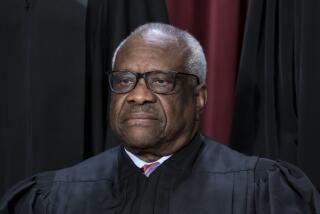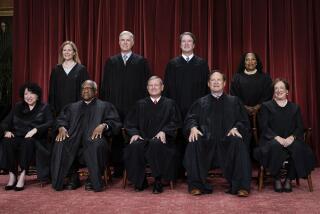Federal Judges Didn’t Disclose Free Excursions
WASHINGTON — Federal judges took more than 12 expense-paid trips to seminars put on by conservative groups but failed to disclose the resort trips on their annual financial reports, as required by federal ethics laws, documents and interviews show.
The excursions, some of which lasted two weeks and cost thousands of dollars, were devoted to discussions of economics and the environment. But the privately financed sessions also offered time for golf and horseback riding at the island resort and historic Western retreats where they were held.
Some public-interest groups have called for judges to decline the trips, complaining that the sponsors accept funding from corporate foundations and conservative organizations with an interest in federal litigation.
The judges who didn’t report the trips said they weren’t trying to hide them but simply forgot to list the excursions.
“It just slipped through,” said Judge Michael Boudin of the U.S. 1st Circuit Court of Appeals in Boston, who didn’t report his two-week trip to Hilton Head Island, S.C., sponsored by the Law & Economics Center.
District Judge John S. Rhoades of San Diego attended two Law & Economics Center seminars but disclosed neither. “I goofed,” he admitted, but said he had no qualms about accepting such gifts.
“They’re in nice places,” Rhoades said of the seminars. “I learned a lot. Like, if you build a car and make it absolutely safe, can anybody afford to buy it? Stuff like that.”
A review of seminar participation lists shows at least 19 judges who didn’t publicly disclose attending the sessions. Although judges need not report every event they attend, federal law directs them to disclose any gift or expense reimbursement valued at $250 or more.
The sponsors of the trips--the Law & Economics Center at George Mason University in suburban Washington and a Montana nonprofit, the Foundation for Research on Economics and the Environment (FREE)--acknowledged in interviews that they covered travel, lodging, food and tuition expenses for virtually every participating judge.
Twelve of the non-disclosing judges confirmed in interviews that the sponsors paid their way to 14 seminars held at various resorts; three other judges acknowledged attending but said they couldn’t remember who paid the cost. Four judges did not respond to requests for clarification.
Ethics experts said they knew of no instance in which a judge had been disciplined for non-disclosure.
As their financial disclosure forms have come under increased scrutiny in recent years, federal judges have balked at making them publicly available, as required by law. They have cited security concerns in arguing that the forms--which contain no addresses or telephone numbers--shouldn’t be posted on the Internet.
Last month, Chief Justice William H. Rehnquist announced that the judiciary may seek to amend the nation’s disclosure laws.
Seminar sponsors describe their programs as unbiased courses on the basic principles of economics and science. Most judges agreed; a few described the sessions as emphasizing a corporate or conservative viewpoint.
More to Read
Sign up for The Wild
We’ll help you find the best places to hike, bike and run, as well as the perfect silent spots for meditation and yoga.
You may occasionally receive promotional content from the Los Angeles Times.






